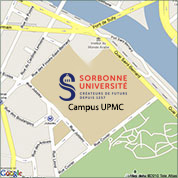Séminaire ISTeP - Michael Bostock
(EOS, UBC, Canada)
LVZs and LFEs: New Perspectives on Slab Structure and Slow Slip in Northern Cascadia
Landward dipping low-velocity zones (LVZs) that align approximately with intraplate seismicity are seismically detected in virtually all subduction zones. I review studies that constrain the properties of the LVZ in Cascadia where it has been extensively studied for over a quarter century. A model in which the LVZ is identified with hydrated pillow basalts and sheeted dikes of oceanic crustal Layer 2 is consistent with available data and reconciles previously conflicting interpretations. In this model, the upper oceanic crust is pervasively hydrated through circulation at the ridge and becomes overpressured upon subduction as a result of dehydration reactions combined with impermeable plate boundary above and low-porosity metagabbroic Layer 3 below. Near-lithostatic fluid pressures within the LVZ lead to unusually high Vp/Vs ratios and low S-velocities, and conceivably alter the rheological properties of the plate boundary region where episodic tremor and slip occur. Using network detectors, we have assembled low-frequency earthquake (LFE) templates from tremor in 4 regions within Vancouver Island and Washington state. These templates represent band-limited empirical Green's functions and I will demonstrate how they can be exploited to further improve our understanding of tremor locations, mechanisms and LVZ structure.
13/11/2013 à 16h, Salle Fourcade
Egalement dans la rubrique
Chiffres clés (Mars 2025)
L'ISTeP comprend 131 membres dont :
Permanents (66)
- Professeurs : 17 (+2 PAST)
- Maîtres de conférence : 26
- Directeurs de recherche CNRS : 1
- Chargés de recherche CNRS : 1
- ITA : 19
Personnels non permanents (65)
- Collaborateurs bénévoles / émérites : 17
- Chaire de professeur junior : 1
- Enseignants-chercheurs contractuel : 2
- 1 MCF accueil en délégation
- ATER et Post-Docs : 9
- Doctorants : 32
- ITA-BIATSS : 3





